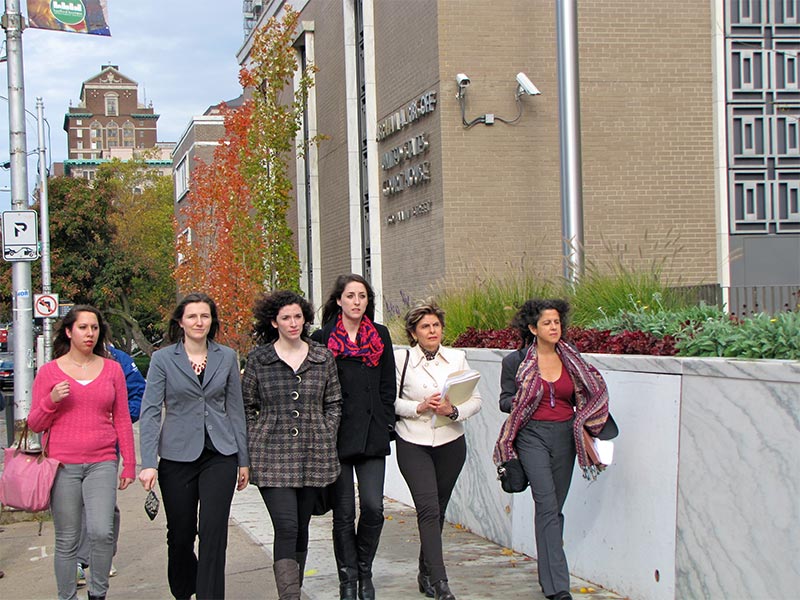Posted by Garrison, Levin-Epstein, Fitzgerald & Pirrotti, P.C. in News
Nov 8 2013
As it appeared in the Connecticut Law Tribune
New Haven attorney Nina Pirrotti is well known in employment law circles. She’s spoken at numerous American Bar Association and Connecticut Bar Association conferences on various topics.
Through those speaking engagements, Pirrotti caught the eye of celebrity civil rights attorney Gloria Allred. Now Pirrotti has teamed up with Allred as local counsel in the highly publicized sex discrimination case on behalf of several current and former students against the University of Connecticut. The women allege that the university failed to properly investigate sexual assault claims.
The lawyers filed a Title IX complaint with the U.S. Department of Education’s Office of Civil Rights and then a separate federal lawsuit in U.S. District Court in Connecticut.
Virginia “Ginger” Hardwick, of the employment firm of Hardwick Collier in Doylestown, Pa., played a key role in getting Pirotti involved in the UConn case. Hardwick is working with Allred on a separate case involving cocktail servers at Resorts Casino Hotel in Atlantic City who were fired to make room for younger women.
Hardwick said Allred asked her to recommend a Connecticut lawyer and Hardwick had just heard Pirrotti speak at an ABA conference. “I knew she was outstanding,” said Hardwick.
Pirrotti is a partner at Garrison, Levin-Epstein, Richardson, Fitzgerald & Pirrotti in New Haven. Before joining the firm in 2005, she had already devoted nearly 15 years to civil rights and public service. At the Queens County District Attorney’s Office in New York, she was appointed to the Career Criminal Major Crimes Bureau, prosecuting homicides, bank robberies, kidnappings, and pattern crimes. She’s also worked as an assistant corporation counsel at the Law Department for the City of New York.
Pirrotti said her experiences as a prosecutor and an employment lawyer will both come into play during the UConn civil rights case. For example, she has prosecuted both murder and attempted murder cases involving boyfriends killing or trying to kill their girlfriends. And as an employment lawyer, she’s investigated and tried her fair share of workplace sexual harassment cases. “I often find myself investigating and pursuing cases of sexual harassment.”
There are “compelling” similarities, she said, between workplace discrimination and the inadequate response of educators to sexual assault allegations. “You would think they were very different but when you take away all of the external factors, it comes down to one commonality. In both cases I empower victims.”
In a criminal case, she would empower victims by “giving them the tools to hold the perpetrator responsible for what they did to them,” Pirrotti said. Similarly, in the workplace, whether her client is a disabled employee, a member of a minority group or an older worker, she helps them speak up and fight against potential retaliation for discriminatory treatment. She said the key in both civil and criminal cases is “figuring out where the truth lies.”
“My investigatory skills as a prosecutor have also helped me in good stead with the work that I’ve done on behalf of employees,” said Pirrotti.
Police Indifference Charged
Last month, seven women — UConn students and recent graduates — asked the U.S. Department of Education’s Office for Civil Rights to conduct a federal Title IX investigation. The women allege the school failed to protect them and responded to their sexual assault complaints with deliberate indifference or worse.
A week later, four of the women filed a lawsuit in U.S. District Court in Connecticut. The claim alleges four counts of sex discrimination in violation of Title IX, which guarantees equal educational opportunities to students at schools that receive federal funds. The 38-page complaint seeks unspecified monetary damages and changes in university policies.
Rose Richi, a UConn junior, alleges that a football player sexually assaulted her. According to the lawsuit, a university police officer said to Richi he did not believe her, and no criminal charges were brought. Police also failed to notify her that she had the right to bring the alleged perpetrator up on administrative charges, according to the lawsuit.
Several school officials are accused in the lawsuit of failing to perform their duties as mandatory reporters. In one case, according to the court filings, plaintiff Kylie Angell was told that an administrative complaint “was the usual response by victims, and that going to the police was a last resort in case the hearing did not bring about the results that Ms. Angell felt were necessary (such as the rapist being expelled from campus).”
Angell says she went to police herself after her attacker returned to campus and a female police officer told her: “Women need to stop spreading their legs like peanut butter or rape is going to keep happening until the cows come home.”
A UConn spokeswoman said the university will “carefully assess the allegations contained in the federal lawsuit,” that they cannot discuss “specific allegations publicly due to federal student privacy protections and the legal constraints of pending litigation, but will respond accordingly as part of the legal process in that venue.”
Just after the lawsuit was filed, Pirrotti said: “Our clients did not just bring this lawsuit to seek justice for their university’s conduct toward them. It is their hope, and ours, that this lawsuit will engender meaningful change in the manner in which UConn empowers its students to avoid sexual assault and, when such efforts fail, provides them with the support, resources and protection they need to cope and move forward.”
Posted by Garrison, Levin-Epstein, Fitzgerald & Pirrotti, P.C. in News
Tagged Nina Pirrotti









